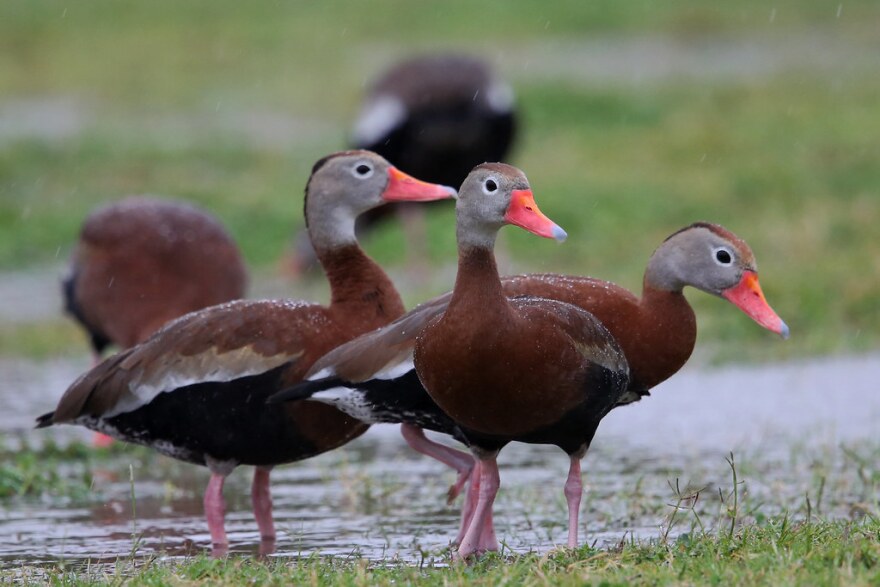In this relatively slow birding week, the lingering big story is that of the mysterious bird illness affecting states to our south, and whether it will come to Massachusetts. There are still no confirmed cases known for New England, but Mass Wildlife is now urging everyone take down their bird feeders out of an abundance of caution. At least one suspicious but unconfirmed case of a fledgling robin with symptoms matching the mystery disease has been reported to a wildlife rehabilitator in Eastern MA, but none on Cape Cod so far. If you see any birds with crusted eyes and unsteady behavior, please report them to the state at the link that will be on the Bird Report website. It has mostly affected robins, grackles, Blue Jays, and starlings, but several other common species as well. Some sources say hummingbird feeders are ok to leave up, but make sure to keep them clean.
In better news, an odd duck is visiting Cape Cod. While “odd duck” often seems the most common species around here, in this case it is an actual duck, and one not expected this side of Texas. This duck has a helpful name, which is rare in birds, that takes you on a multi-sensory word tour of the bird – I’m talking about the Black-bellied Whistling Duck, the duck that looks like a goose, eats like a finch, nests like a woodpecker, and sounds like a dog toy.
At Salt Pond in Falmouth, one of these striking, long-legged ducks spent last Thursday loafing on the mud, to the delight of the several birders who made it over there. With a hot pink bill, rich russet breast and back, white sides, and that eponymous black belly perched atop a pair of long pink legs, it does not blend in with our more understated local ducks at this season. The long neck and legs and upright posture say goose, but they nest in tree cavities like a Wood Duck, and eat primarily seeds like a finch – go figure. Another has been on Nantucket and Tuckernuck of late, including the same day the Salt Pond bird was here, so unless it is a really fast flier, we have two in the region right now. This is just the third record for the Cape, for the record.
Most rare birds turn up as stray loners, but Black-bellied Whistling Ducks are quite social and often arrive en masse – a whopping 11 stopped by a pond in Sandwich five years back, and a flock of 6 appeared in Wareham back in 2019. There’s been an uptick in sightings in recent years, so something is up with this species, it seems. The bulk of their range is from Central America down through the Amazon lowlands of South America, and only the very northernmost populations, like Texas, migrate, so what’s bringing them our way is anyone’s guess. Some species seem to have a tendency for wrong-way dispersal baked into their genes.
Odd ducks aside, this is getting to be peak shorebird season, though it seems numbers are modest so far away from restricted parts of Monomoy National Wildlife Refuge and other hard-to-reach parts of Chatham, where the old shorebirding hotspots are a bit out of reach these days thanks to shifting sands and inlets. But those aren’t the only places to look - we should all be checking our local mud flats, marshes, and barrier beaches from Race Point to Horseneck and Great Point to Aquinnah, because the Arctic is pouring forth its shorebird bounty, and upwards of 30 species of sandpiper and plover are out there waiting to be found – no birdfeeders needed.








